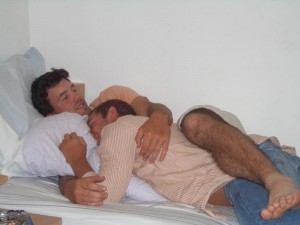Innocence
This week’s blog is dedicated to the courageous, full-hearted and sweet men of the Pacific Northwest, from Tacoma to Vancouver and points in between. I continue to hold you in my heart, brothers.
Innocence is a potent and powerful tool for spiritual practice available to all of us. It is a valuable posture that seems largely disregarded, devalued or forgotten about by adult men. Innocence is the quintessential power of infancy and youth. If the Fountain of Youth were found tomorrow, analysis of the water would surely find “innocence” as the active ingredient.
 Most adults will run to the rescue of a young one in danger out of an instinctive reaction to protect and defend innocence. All a child has to do is sit there, looking innocent, and, without any further effort on the part of the child, even total strangers will often act in response to protect that quality.
Most adults will run to the rescue of a young one in danger out of an instinctive reaction to protect and defend innocence. All a child has to do is sit there, looking innocent, and, without any further effort on the part of the child, even total strangers will often act in response to protect that quality.
And when they don’t—when there are violations of innocence—we hold such acts to be among the most heinous of human transgressions. Even in the misery of prisons, among the most hardened criminals, a special hatred is reserved for those individuals who have transgressed the innocence of children.
So while I think we’re often not aware of it, I believe we are wired instinctively to protect and defend innocent space. We defend innocence in children because we need it as grown-ups, too, although we’re frequently completely out of touch with it as a useful force in adult life.
Innocence has an interesting number of different definitions. In one sense it means “not knowing, naive, unfamiliar.” In another sense, it means to be not guilty, as of a crime. It can also have meaning around non-harm as an intention or motivation, as in the phrase “an innocent mistake.”
When we come at unfamiliar things from a curious and open heart, not knowing, not intending any harm, exploring and unsure of ourselves, we come from innocence. And to the degree that men, whether in the workplace, sports or relationships, are pressured (by themselves or others) never to appear unsure, unaware, insecure, unprepared, or undecided, always to “know the answer,” then to that very same extent we cut ourselves off from the power of innocence. The act of claiming “I know!” cuts us off from a tremendous source of power, closes down awareness, limits possibilities. The practice of “I’m not sure” opens the fountain of youth.
We may feel that once we’ve grown up, we are no longer entitled to innocence, no longer have access to it. Because we have this odd perception of time as a linear thing, we tend to see ourselves as moving from left to right on some child-to-adult timeline. However, as I’ve said before, if you’ve ever accessed your “inner child” or asked your young son or daughter for their “best grownup behavior” you know that this is a false construct.
 We grown-ups have, at this moment, all of our child-pieces available to us. If you can access your wounded child, you can access innocence. If you can access the part of you that was not properly or sufficiently nurtured, you can access innocence. We make efforts to reach back to touch our hurts from childhood all the time. While you’re back there, why not grab hold of this amazing source of power as well?
We grown-ups have, at this moment, all of our child-pieces available to us. If you can access your wounded child, you can access innocence. If you can access the part of you that was not properly or sufficiently nurtured, you can access innocence. We make efforts to reach back to touch our hurts from childhood all the time. While you’re back there, why not grab hold of this amazing source of power as well?
One of the most powerful aspects of Touch Practice manifests when we are able to create innocent space, space in which grown men can touch each other, play, be held, laugh, cry, all in a posture of innocence. We create a shared, conscious practice of “I don’t know, I’m not sure, I’m curious, I want to explore, and I intend not to harm you.” That’s it. No end goal. No manipulation. No covert outcomes. No guilty assumptions. Innocence.
 A conscious practice of innocence, in its many different meanings, can powerfully rewire the way we experience touch. When we adopt the posture of “I don’t know; I’m not sure,” we learn to pay more careful attention to our experience. Rather than thinking with our jaded adult minds, “ha, I know where this kind of touch is going to end up,” we pay attention as though it’s the first time we’ve ever experienced this touch with this partner (because, most of the time, it is.) We notice breathing as though we never have before (usually, we haven’t.) We notice emotion. We notice body posture. We encounter another body as if for the first time, with childlike curiosity. For those of you who have done this work, you know it’s not difficult at all. It is somewhat miraculous, when it appears, this innocent state, but we get there in well less than an hour, and fairly reliably.
A conscious practice of innocence, in its many different meanings, can powerfully rewire the way we experience touch. When we adopt the posture of “I don’t know; I’m not sure,” we learn to pay more careful attention to our experience. Rather than thinking with our jaded adult minds, “ha, I know where this kind of touch is going to end up,” we pay attention as though it’s the first time we’ve ever experienced this touch with this partner (because, most of the time, it is.) We notice breathing as though we never have before (usually, we haven’t.) We notice emotion. We notice body posture. We encounter another body as if for the first time, with childlike curiosity. For those of you who have done this work, you know it’s not difficult at all. It is somewhat miraculous, when it appears, this innocent state, but we get there in well less than an hour, and fairly reliably.
Sometimes we have to consciously defend our right to innocence, whether to ourselves or to others. A piece of us needs to stand up and say, in effect: “I’m not guilty—I’m innocent; whatever motive you’re accusing me of, or whatever motive you’re assuming, not true.” Making space for innocence is not a habitual practice among adult men. And the less a person has their own experience of innocence, the more they will project suspicion, guilt, or cynicism onto others. It’s as though they can’t conceive of such a space, and because they haven’t created any room in their own lives for innocence, it doesn’t exist in their perception of others. But it does exist; it’s real, it’s powerful, and it’s here now, available to you, wherever you are in your life.
 Men do not lose the rights we had as boys just because we grow up! We still have the right to playfully and openly explore feelings; we still have the right to explore the erotic without having ourselves labeled, boxed or categorized. We still have the right to feel arousal without being on a railroad track as to what we are expected to do about erotic feelings. We have the right to be naked in our own bodies and even to explore each others’ naked bodies with complete innocence; from a point of curiosity, from playfulness rather than seriousness, from a place of not-knowing rather than a predetermined, outcome-driven place.
Men do not lose the rights we had as boys just because we grow up! We still have the right to playfully and openly explore feelings; we still have the right to explore the erotic without having ourselves labeled, boxed or categorized. We still have the right to feel arousal without being on a railroad track as to what we are expected to do about erotic feelings. We have the right to be naked in our own bodies and even to explore each others’ naked bodies with complete innocence; from a point of curiosity, from playfulness rather than seriousness, from a place of not-knowing rather than a predetermined, outcome-driven place.
In short, no matter what your age, you are entitled to innocence. You were born with it; it’s with you now. Like most helpful spiritual qualities, innocence is a practice. Claim it. Make some space for it in your life. Practice it. Give the mantra, “I don’t know” a few days worth of practice; try it out. (Some claim that “I don’t know” is a state of enlightenment!)
Try out the inner affirmation, “I’m sorry, I believe you’ve mistaken me for someone else: I’m innocent” whenever that accusatory voice shows up inside. Consider the costs, in business, in relationship, in spiritual practice, of striving and straining to achieve a constant state of “I know it; I have it figured out; I’m sure of myself.” Consider instead the value of creating a whole lifetime of “I don’t know; I’m not sure; I’m curious; I’m open. I’d like to learn. I’d like to understand. Show me. Tell me.”
This week, may you locate, nourish and reclaim, if necessary, your innocence.
Have thoughts you’d like to share?
Touch Practice is a sacred practice for me, and part of that is keeping confidences sacred. While a name and e-mail address are required to post a comment, feel free to use just your first name, or a pseudonym if you wish. Your e-mail address will never be seen by or shared with anyone. It is used to prevent spam and inappropriate comments from appearing in the blog. I’d really like to hear from you!














Kevin,
I just read this newest blog and when I clicked on it, immediately the image of the sweet baby face popped up on the screen. I feel like bursting into tears. As one of the Pacific Northwest brothers you nurtured recently, I can truly say I fell into a place of deep innocence and joy while I was with you. What a blessed time of “I don’t know” for me. THANK-YOU! 🙂
Paul
Paul: equally blessed for me. It was a real treat to meet you and sit with you after the many e-mails we’ve exchanged. Your body is as strong and powerful as your mind, and I am happy to have experienced both. Thanks for your courage, honesty, and open-heartedness.